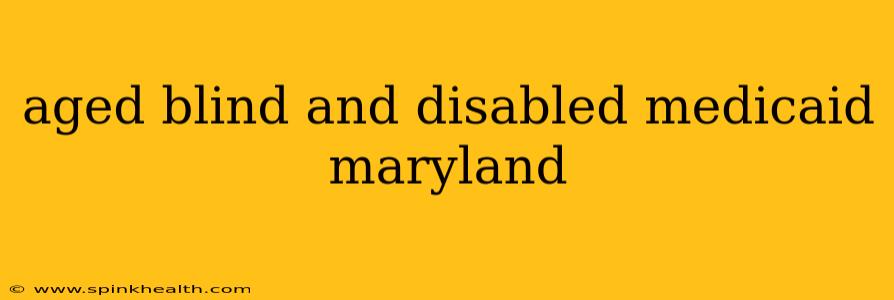Navigating the Maryland Medicaid System: Support for Aged, Blind, and Disabled Individuals
The Maryland Medicaid system offers a crucial lifeline for many aged, blind, and disabled individuals, providing access to vital healthcare services they might otherwise struggle to afford. However, understanding the complexities of this system can feel overwhelming. This guide aims to illuminate the path, addressing common questions and concerns faced by those seeking assistance. Think of it as your personal roadmap through the often-confusing world of Maryland Medicaid.
My journey to understanding this system started with a phone call. My grandmother, recently diagnosed with a debilitating illness, was struggling to manage her medical bills. We were lost in a sea of forms, eligibility requirements, and bureaucratic jargon. It was a frustrating and emotional experience, but it taught me the importance of clear, accessible information for those navigating the system.
What are the eligibility requirements for Maryland Medicaid for the aged, blind, and disabled?
Maryland Medicaid eligibility for the aged, blind, and disabled isn't a one-size-fits-all situation. It depends on several factors, primarily your income and resources. "Resources" include assets like savings accounts, stocks, and bonds, while "income" refers to your monthly earnings from employment, pensions, or Social Security. The specific income and resource limits vary and are regularly updated, so it's crucial to check the Maryland Department of Health's website for the most current information. Furthermore, there are different programs under the Medicaid umbrella—each with its own set of guidelines. For instance, some programs might prioritize those with specific medical conditions or disabilities.
How do I apply for Maryland Medicaid if I am aged, blind, or disabled?
The application process itself can feel daunting, but it's manageable with the right guidance. You can apply online through the Maryland Health Connection website, or you can download and submit a paper application. Be prepared to provide extensive documentation proving your identity, income, resources, and medical needs. This includes proof of age, disability documentation from your physician, tax returns, bank statements, and more. Gather everything upfront to streamline the process. Don't hesitate to seek assistance from family, friends, or local community organizations.
What services are covered by Maryland Medicaid for the aged, blind, and disabled?
Maryland Medicaid aims to provide comprehensive healthcare coverage. This generally includes doctor visits, hospital stays, prescription drugs, mental healthcare, and some long-term care services. The specific services covered can vary depending on the individual's needs and the specific Medicaid program they qualify for. It's important to remember that coverage isn't always all-inclusive. Certain treatments or medications might require prior authorization.
What happens if my application for Maryland Medicaid is denied?
Receiving a denial can be disheartening, but it's not the end of the road. You have the right to appeal the decision. The appeal process involves submitting additional documentation or providing further clarification on your situation. Consider seeking assistance from an advocate or legal aid organization to help navigate the appeal process. They can help you ensure your application is complete and address any issues that might have led to the initial denial.
Are there any community resources available to help me navigate the Maryland Medicaid system?
Absolutely! Many community organizations and agencies dedicated to assisting senior citizens and individuals with disabilities offer guidance and support with Medicaid applications and navigation. Local senior centers, disability advocacy groups, and legal aid societies are invaluable resources. They can provide assistance with filling out applications, understanding eligibility criteria, and appealing denials. Don't be afraid to ask for help—it's available and it can make a world of difference.
Remember, navigating the Maryland Medicaid system requires patience and perseverance. But with the right information and support, you can secure the vital healthcare coverage you deserve. This journey, while challenging, ultimately leads to improved health and quality of life. Don't hesitate to reach out to the resources mentioned above—your well-being is worth the effort.

